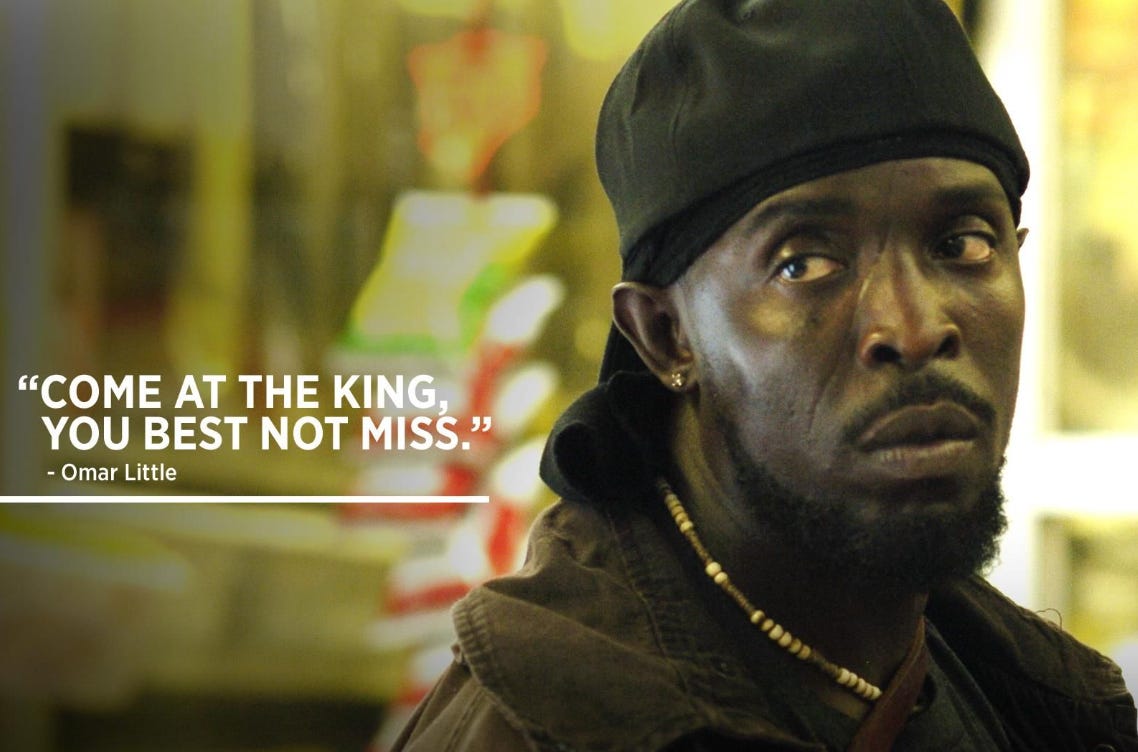Hey friends, welcome back to Think Bitcoin™ for issue #49. As always, if you have any questions or comments, feel free to reach out. You can also find me on Twitter (@TheWhyOfFI) and connect with me on LinkedIn. I’m also on Nostr at npub1zx0uydq67a62k5vhjcsvh0qvedk9ht9gz9t56et6j9k7wayj809qjghdct
In this issue:
Long Reads: Pollyannas and Chicken Littles: 4 Lessons For Bitcoiners
As always, if you find this newsletter interesting or useful, please share it with others who might find it interesting or useful, too!
Long Reads
Pollyannas and Chicken Littles: 4 Lessons for Bitcoiners
As many of you know, before I fully digested the orange pill I was a Bernie Sanders supporter. Not exactly the common, stereotypical soil from which Bitcoiners commonly, stereotypically grow. And yes, there are those who think this transition is absurd and reject everything I have to say after the word “Bernie.” But there are more and more folks making their way to Bitcoin from ideologically heterodox backgrounds.
The more I think about this journey (and I think about it a lot), the more lessons I think can be gleaned from the Bernie campaign and usefully considered by the Bitcoin community. The Bernie campaign was, after all, a similarly bottom-up, mission-driven movement seeking to change society on a systemic level to increase fairness, opportunity, and well-being. Obviously, many of the policies Bernie endorsed for effecting this type of sweeping change were misguided. But it’s hard to deny some common threads when it comes to the ethos and spirit of the movement that was behind his campaign.
Worth noting additionally that, as I’ve spoken/written about before, there was a thread of utopianism in the Bernie campaign and amongst his supporters that I think is similar to that in which Bitcoiners traffic (more on this below).
If you want to read, watch, or listen to more of my previous work on this topic, you can check out these two Bitcoin Magazine articles I wrote (here and here) and the episode of What Bitcoin Did I was on last year.
It’s common in Bitcoin to refer to the stages of adoption as “first they ignore you, then they laugh at you, then they fight you.” The idea is of course that a movement starts with a small, devoted group that is easy to ignore, grows into a large enough constituency that is noticeable but scoffed/laughed at, then keeps growing into an un-ignorable force that has to be affirmatively and openly fought.
Speaking from experience, anyone who supported Bernie Sanders in 2016 and again in 2020 knows this trajectory well. Bernie was largely ignored for most of his political life, was given zero chance to defeat Hillary for the 2016 nomination, and was essentially considered a long-shot joke of a candidate.
But he amassed a following because he struck a chord with lots of people. This following got bigger and bigger, growing beyond the wildest imaginations of the political commentariat and donor class. Bernie was also a threat to the status quo, so his improbable growth was eventually fought hard by the forces that sought to keep the status quo entrenched.
Bernie ultimately failed. But there are lessons in his journey, the obstacles his campaign faced, and the opposition they encountered that Bitcoiners would do well to consider and absorb.
So let’s dig in:
1. Inevitable does not mean imminent
Hillary was inevitable. Ask any good Marxist and they’ll tell you the end of capitalism and the establishment of the worker state are inevitable. Many things that are touted as inevitable simply are not. Other things, like the heat death of the universe or your own death, are inevitable but not imminent.
I would put the death of fiat currency in the “inevitable but not imminent” camp. In light of the recent bank failures and instabilities, many are justifiably asking or proclaiming that this is the moment when the whole fiat system breaks and heralds the beginning of hyperbitcoinization.
Balaji has gone so far as to make a bet that Bitcoin hits $1 million and the dollar essentially hyperinflates in 90 days. He’s made the podcast rounds on this claim, though he’s walked the exact timeline back a little bit on some of the appearances I’ve seen.
Now, don’t get me wrong. I think Bitcoin is going to pump because more and more people are waking up to the fact that the banks don’t have your money and rely on you believing that they do. There’s an increasingly palpable urgency to Bitcoin’s value proposition.
Balaji is ultimately going to be correct. But ultimately is the operative word there. I do not think he’s going to be correct in 90 days or even in one year (speaking with respect to dollar hyperinflation, specifically). To be totally, transparently honest, I don’t see it happening in the next several years either. I think it’ll take longer than that. I could of course be wrong.
In case it’s not self-evident, we should also not be rooting for Balaji to be correct in 90 days or one year. If the dollar hyperinflates in that time, sure, Bitcoin might be worth $1 million USD, but there will be widespread unescapable unrest, mass suffering, and total chaos.
There will also be emergency efforts from the government to effectively close on-ramps and off-ramps, so Bitcoin will become, at least temporarily and location-specifically, more difficult to use.
As an aside, this is part of the reason why I think Jason Lowery’s softwar/2nd Amendment arguments could backfire in almost poetically catastrophic ways. If the U.S. government says sure, let’s treat Bitcoin as a weapon, which makes Bitcoin plausibly classifiable as weapons production, it’s an easy jump to then classify it as a war material (it’s now a weapon, after all), which then gives the executive branch the power to seize facilities producing/securing said material (e.g. bitcoin mining facilities, potentially exchanges, etc.). Did a podcast with a couple other lawyers on this a few months back.
Executive power skyrockets in times of “war” or emergencies. Then it’s👇🏻, but hey, at least everyone thought softwar sounded smart for a while.
Most people remain in no place to quickly pivot to Bitcoin (which means we have lots of work still to do and a diminishing amount of time in which to do it).
This is a matter of inevitability vs. imminence, though. The dollar will eventually reap what it has sown, but it won’t be in 90 days. Won’t be in a year, either.
We often hear and use the phrase “gradually, then suddenly,” but we underestimate how long the “gradually” phase can take. Sometimes it takes a long, long time. Yes, hyperinflations happen fast, but it’s worth noting that Weimar Germany, to use just one example, was in a vastly different geopolitical place than the U.S. of present day. The German mark was not a global reserve currency used in a majority of the world’s commercial transactions, nor was there an insatiable global demand for German marks.
There’s risk both to preparing as if fiat’s demise is imminent and preparing as if it’s inevitable but not imminent. In the case of the latter, though, you’re still solidly prepared if shit hitting the fan turns out to be more imminent than you expected. In the former case, if you’re wrong you render yourself unprepared for a protracted “gradually” period that precedes the “suddenly” period you have focused all your energy on. And there’s significant opportunity cost there. There’s also the risk that you’re wrong altogether, in which case the opportunity cost is total.
Don’t be a Chicken Little.
2. You haven’t won until you’ve actually won (AKA there’s no such thing as “we’ve already won”)
I have deep misgivings about the common sentiment “we’ve already won,” as pertains to Bitcoin. There’s simply no such thing as “we’ve already won.” You can predict that Bitcoin will eventually “win,” however you choose to define winning. But I think it’s an abuse of game theory ideas, a willful disregard for history, and acutely presumptuous to opine that insofar as there is a game to be won, Bitcoin has already, in 2023, won it.
This claim isn’t verifiable in the present in any real way. If I say okay, you’re telling me Bitcoin has already won, can you please prove that victory to me, the response will be that because of x, y, and z circumstances, Bitcoin will, at some point in the future, be widely adopted. In other words, Bitcoin will prove that it has already won when it eventually, in the future, demonstrates that it has won. Which is obviously a bit circular and unhelpful.
Similar to lesson number one, just because I don’t think “Bitcoin has already won” is a particularly useful or accurate sentiment today, it doesn’t mean I don’t think Bitcoin can or will win. I think it’s worth talking about what we mean when we say “win,” a topic for another day, but all I’m suggesting is that nuance is healthy and marketing slogans are not.
I couldn’t be more bullish on Bitcoin than I am right now, but I don’t even think we’ve reached the end-game battle yet, let alone already won. And in the time period between now and then, there are so many variables that can affect or alter the course as it appears to us today. History is replete with examples of unknown unknowns (and known unknowns) emerging to thwart seemingly destined outcomes.
Before someone objects and says “But Logan, it’s just math!” No, it is not just math.
Like “we’ve already won,” “it’s just math” is a pithy (though reductive) Twitter refrain containing an admittedly sizable kernel of truth but devoid of real-world nuance. It is not just math because it’s also politics, geopolitics, national security, domestic/foreign policy, law, government, human behavior, and even chance.
When Bitcoin has actually won, there will be no doubt. There will be no need for discussions or Twitter debates about it. There will be no need to circularly refer to the unknown future for verification because the present will provide ample, emphatic verification.
Thinking in “already won” terms is also definitionally inflexible, non-adaptive, and a close-minded heuristic. If you think in those terms you will not process new information, you won’t assess credible threats to your thesis, and you will harbor blind spots.
“Most of what people call conviction is just a willful disregard for new information that might make you change your mind.” -Morgan Housel
Don’t be a Pollyanna.
3. Never underestimate the opponent when the opponent is the status quo
This is a lesson Bernie supporters learned the hard way. I fear it’s a lesson we Bitcoiners will learn, as well, though our education in this area won’t be terminal, as it was for the Senator from Vermont.
This is a position I’ve evolved on through more reflection, more time spent reading history, and more time observing how the powers that be have been responding to Bitcoin’s growing adoption.
When you’re engaged in a project that seeks to effect systemic change, you must appreciate the fact that the system you’re seeking to change (and those who wield the most power within it) will respond accordingly.
In other words, if the status quo perceives an existential threat, it will respond with existential urgency and existential scope.
Study literally any war or revolution and you will see this. You will also see that this posture increases unpredictability, sociopolitical volatility, and the menu of policy options on the table. This means more unknowns. Game theory™ won’t neatly play out as predicted from the outset.
A failure to recognize this is a failure to appreciate the scope of that which you’ve undertaken.
“We know that no one ever seizes power with the intention of relinquishing it. Power is not a means; it is an end.” - George Orwell
I also think the ongoing SEC carpet bombing of the crypto industry, coupled with the recent White House report is relevant here, too.
Lots of Bitcoiners think Coinbase going down, or all cryptocurrencies being deemed securities, de-listed, etc. is good for Bitcoin because the SEC knows Bitcoin isn’t a security and will leave it alone.
In my opinion, this is an example of just sort of seeing what you want to see and fitting real-time events into your own desired view of the world. The real takeaway is that this administration hates ALL crypto. It is not giving the stink eye to “crypto” while looking lovingly upon Bitcoin. It is not making the nuanced distinctions between bitcoin and the wider digital asset space that Bitcoiners repeatedly do.
Moreover, I don’t care what Gary Gensler said about Bitcoin when he was teaching at MIT, nor do I care about how interesting he finds Satoshi. Don’t get it twisted. This man is a politician - he isn’t an economic philosopher. He will do what he’s told by the administration, and this administration hates all of crypto.
They’re going after the non-Bitcoin stuff now because it’s the lowest hanging fruit and the easiest to address with existing tools (like the rickety old Securities Act of 1933). But that doesn’t mean they won’t try to hamper Bitcoin through other means, more indirect means, using different tools or inventing new tools to use.
And yes I know, pleb brothers and sisters, Bitcoin can’t be shut down by governments. I know. Which is why none of this is ultimately fatal. But the power of the state (which is to say, the status quo) to close or degrade the on/off ramps, de-bank companies, send it all offshore, nuke the financial rails, run negative publicity campaigns, impose draconian requirements on firms that touch btc, etc. is underestimated. And it shouldn’t be.
“If you know the enemy and know yourself, you need not fear the result of a hundred battles. If you know yourself but not the enemy, for every victory gained you will also suffer a defeat. If you know neither the enemy nor yourself, you will succumb in every battle.” -Sun Tzu
If we want to change the status quo, we have to know and respect its sheer magnitude.
Don’t be a Pollyanna.
4. Utopianism is blinding
The human brain seems to love utopian narratives. Dystopian narratives, too. Particularly in a world of social media and clickbait, we all find ourselves shaped into Pollyannas and Chicken Littles at some point. The sky is falling and a prelapsarian return to bliss is upon us.
As I’ve written about before, there’s a thread of utopianism that runs through Bitcoin, and it’s actually similar to the one that runs through other ideologies like Marxism (gasp!).
Marxists would say once we topple the evil capitalistic system and establish a worker state, we’ll be well on the road to communism, which means everyone will be happy, contributing what they can, taking what they need, etc.
Bitcoiners would say once we topple the fiat system, we’ll be well on the road to hyperbitcoinization, which means everyone will bask in a world of fairness and sunshine, getting justly paid for their hard work, eating uncorrupted food, getting uncorrupted education, and generally flourishing.
Bernie Sanders supporters used to say that once we topple the political establishment, we’ll be well on the road to a new collective-minded paradigm, which would provide a safety net for all, lift everyone out of poverty, etc. etc. You know where I’m going with this.
Put simply, this sort of utopianism will blind you because it’s a fantasy.
All utopias are fantasy.
Seductive, yes. But fantasies, nevertheless. This is earth, not Eden. We are humans, not cherubs. Fantasies of the future keep you from seeing, understanding, and responding to the present.
As always, thanks for reading! If you enjoyed it or found it useful, share this newsletter widely and freely!
In the meantime, as Bob Dylan said, “Don’t follow leaders, and watch your parking meters.”
See you next time,
Logan
SUPPORT
Send bitcoin to my Strike
SOCIAL
DISCLAIMER: I am not investment advisor and this is not investment advice. This is not, nor is it intended to be, a recommendation to buy or sell any security or digital asset. Nothing in this newsletter should be interpreted as a solicitation, a recommendation, or advice to buy or sell any security or digital asset. Nothing in this newsletter should be considered legal advice of any kind. This newsletter exists for educational and informational purposes only. Do your own research before making any investment decisions.
© Copyright Logan Bolinger, Think Bitcoin LLC







Great article - love the perspective